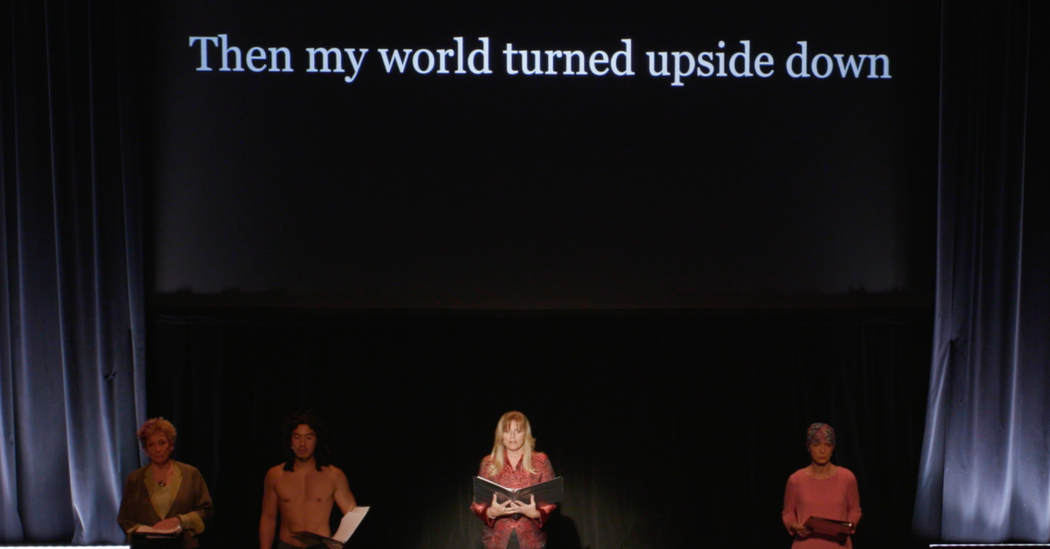
Several years ago I found myself lost one night near Big Sur, Calif. Fog encircled me, erasing the full moon that would have helped me find the path to my friend’s house. I stopped and waited, anxiety building, when suddenly I took several steps into a gap in the fog. The moon, uncovered again, revealed the way forward. A few tiny steps and my entire perspective had changed.
I understood the metaphor: Change your perspective to change your life.
I thought about that metaphor, or lesson, recently when I attended a performance of dance, song and spoken word created by patients in Memorial Sloan Kettering Cancer Center’s Visible Ink program, a free one-on-one writing program for the hospital’s patients and caregivers. Since 2008, more than 2,300 patients, and nearly 300 mentors (including myself), have participated in the writing program. For 11 springs, the show’s director, Greg Kachejian, has stitched together a one-night performance, delivered by professional actors.
Midway through the emotional 90-minute show, I sat straight up in my seat when a Broadway actress began a dramatic reading of a poem titled “All I Want, ” written by Sarah Porwoll, 36, who had been given a diagnosis of breast cancer four years earlier, just six days after her boyfriend had proposed. “It was a very intense time,” she explained, “going from sharing the news of being engaged with all my friends and family to then letting everybody know I was about to go through surgery.”
Mrs. Porwoll told me that after her treatment ended, she started to jot down random feelings and thoughts about her illness. A year later she joined Visible Ink, and in tandem with her mentor wrote “All I Want.” “It helped me get my thoughts and feelings out,” she explained. “Maybe if someone else was quietly going through this on their own, it would help them to read this in some way.”
On the darkened stage, the poem was read as the words scrolled by on a scrim.
I’m bored by the repetition of day-to-day life
So I rarely feel like
Each day is a gift
Now
I know
I can’t explain how it feels to believe that
To be normal
Makes me feel like all I want is
The unexpected
Then my world turned upside down
After a pause, the actress read the poem again, this time starting with the last line, reading from the bottom up:
Then my world turned upside down
The unexpected
Makes me feel like all I want is
To be normal
I can’t explain how it feels to believe that
I know
Now
Each day is a gift
So I rarely feel like
I’m bored by the repetition of day-to-day life
The audience gasped as the reading ended, then we applauded loudly. The change in perspective had completely altered the poem’s meaning.
I asked Mrs. Porwoll what the poem meant to her. “It’s about the shift in perspective I’ve had, now that I’ve had even more time between everything that happened, and where I am today,” she told me. “I would catch myself feeling, like, ‘Oh, I’m just riding the subway. I’m going to work. I’m coming home, I’m doing chores.’ That’s what I craved the most when I was going through treatment — to think about the normal things I would think about in a day, to not have the struggles that came along with going through treatment. I find myself needing to remind myself of the joy that can come in the everyday things.”
Mr. Kachejian, the show’s director, told me he included “All I Want” because he was certain it would resonate with the “entire audience — not just those diagnosed with cancer.” When something dramatic happens — whether it’s a cancer diagnosis, a divorce, getting fired or another traumatic event — your world is turned upside down. “You then begin to relish the things that bored you — you long for normalcy, ” he said.
Writing can facilitate that process. “Writing forces people to stop and rethink their lives,” said James Pennebaker, a professor of psychology at the University of Texas at Austin and author of “Open Up By Writing It Down.” “It’s an opportunity to translate our confusing emotions and emotional experiences into words.” After writing it down, he said, “people often have a better understanding of themselves and their situation.”
Patents write for all kinds of reasons, said Judith Kelman, Visible Ink’s founder and executive director: to complete a story or novel, to gain leverage over a terrifying illness, to reconnect with a loved one who has died. For patients at the end of life, Ms. Kelman has witnessed “great peace and healing, from the chance to say and record final thoughts, tell a long-held secret or fulfill the wish of leaving something permanent — in visible ink — as a legacy for loved ones.”
And sometimes writing can be a very effective way to change your perspective and start a new life.
Steven Petrow (@stevenpetrow), a regular contributor to Well, lives in Hillsborough, N.C.

